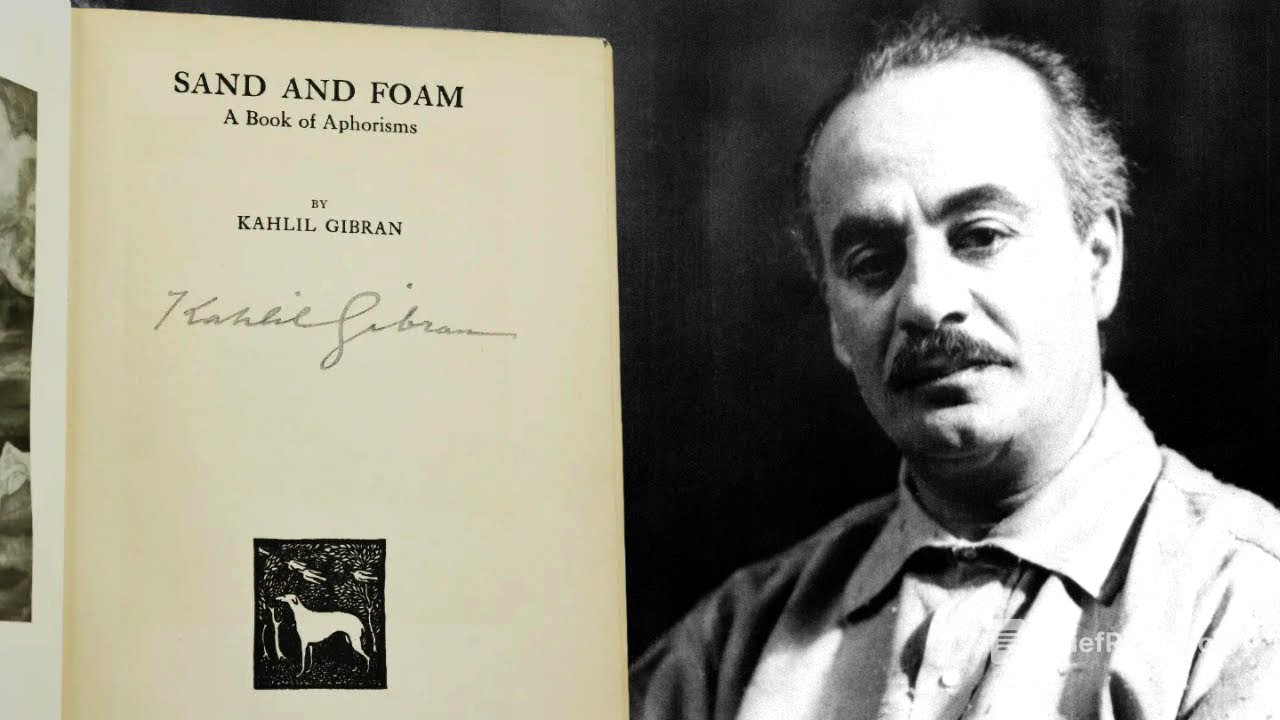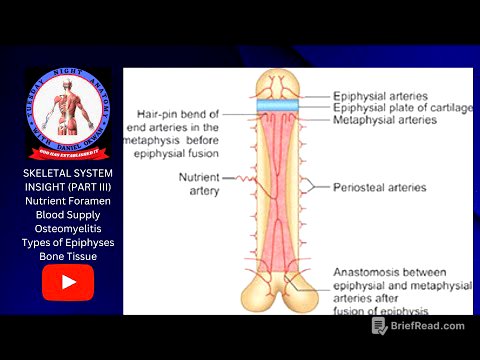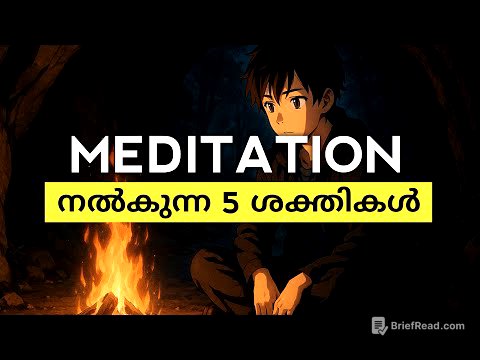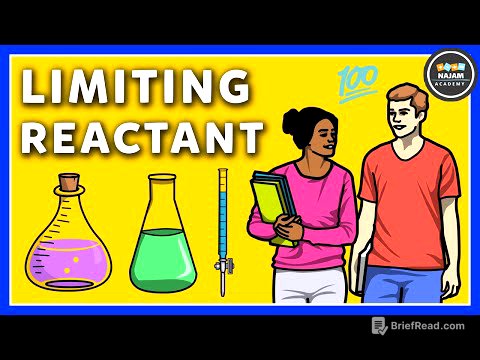TLDR;
This YouTube video features a collection of profound and insightful sayings, exploring themes of life, love, truth, and humanity. The speaker touches on the nature of existence, the importance of perspective, and the complexities of human relationships. Key takeaways include the interconnectedness of all things, the value of both joy and sorrow, and the constant search for meaning and understanding in a world filled with contradictions.
- The interconnectedness of life and the universe.
- The balance between joy and sorrow in personal growth.
- The importance of perspective in understanding truth and beauty.
- The complexities of human relationships and the search for meaning.
Walking on Edges and the Sea's Embrace [0:03]
The speaker begins with a reflection on impermanence, describing walking between the sand and the foam, where waves erase footprints and wind blows away traces. Despite this, the sea and shore remain, symbolizing enduring truths. The speaker shares a mystical experience of filling a fist with mist, which transforms into various forms—a worm, a bird, a sad man—before reverting to mist, accompanied by a sweet tune. This illustrates the transient nature of forms and the underlying harmony of existence.
The Circle of Life and Infinite Oceans [0:57]
The speaker transitions to a realization of completeness within the circle of life, understanding oneself as the whole circle with life's pieces revolving within. This contrasts with the perception of being a mere grain of sand on an infinite shore. In dreams, the speaker envisions being the infinite ocean, with all worlds as grains of sand on their shore, emphasizing a shift in perspective from insignificance to boundlessness.
Encounters and Ancient Words [1:44]
The speaker recounts an encounter where they were asked, "Who are you?" and reflects on humanity as God's first word. They touch on a long history of wandering and searching before language, questioning how to describe the past with only yesterday's words. The Sphinx's statement about the grain of sand being a desert and vice versa is mentioned, highlighting the interconnectedness and scale of existence.
Dust of Egypt and the Nile's Bank [2:55]
The speaker describes a period of silence and unawareness in the dust of Egypt, followed by a rebirth from the sun and a journey along the Nile, singing with the day and dreaming with the night. Despite the sun's attempt to make them sleep in the dust again, they stand upright and walk smoothly along the Nile's bank, illustrating resilience and transformation.
Time, Distance, and the River of Light [3:46]
The speaker explores the concepts of remembering and forgetting, likening them to meeting and freedom, respectively. They question how to reconcile measuring time with small clocks and the vast rotation of suns. The absence of distance between the earth and sun for those who gaze at the Milky Way is noted, followed by a description of humanity as a river of light flowing eternally.
The Holy City and the Lion's Prey [5:02]
The speaker recounts a journey towards a holy city, guided by a traveler who ultimately led them astray. This leads to the realization of being given the wrong direction and the traveler's anger. A prayer is offered: "God, make me a prey to the lion but do not make me a hunter of rabbits," expressing a desire for meaningful challenges over petty pursuits.
The House and the Path [5:54]
The speaker describes a conflict between the comfort of home and the call of the path, recognizing that even in stillness, there is movement, and vice versa. They conclude that only love and death can truly change everything, emphasizing the transformative power of these forces.
Justice of Life and Hating the Soul [6:47]
The speaker questions the justice of life, noting that dreams of those who sleep on wings are not necessarily more beautiful than those who sleep on the ground. They express the strange pain of desiring happiness. Seven instances of hating their soul are listed, each representing a compromise of integrity or a failure to recognize truth within oneself.
Dreams, Paradise, and Understanding [8:17]
The speaker acknowledges not knowing the real truth but leaning on their own naivety, finding respect and reward in this stance. They describe the space between a man's dream and achievement as one traversable only by desire. Paradise is depicted as being just behind a door in the next room, but the key is lost. The speaker suggests that the blind and deaf should hold hands to understand each other, emphasizing the importance of what one wants to get over what one gets.
Ink, Papers, and Sponges [9:34]
The speaker uses the metaphor of ink and paper to illustrate interdependence, noting that some must be black for others to speak, and some must be white for others to see. Thoughts are likened to sponges and the heart to a river, with most people preferring to suck rather than flow. The speaker suggests that when one desires a happiness they cannot name or feels sad without reason, it signifies growth and movement towards a bigger form.
Intoxication and Empty Cups [10:46]
The speaker observes that even slight statements of someone lost in dreams seem like alcohol. They drink to regain senses through another intoxication. Accepting an empty cup is easier than dealing with one that is half full, indicating a preference for clarity over ambiguity.
Truth of Another Person and Useless Words [11:30]
The speaker asserts that the truth of another person lies not in what they show, but in what they conceal. To understand someone, one must understand what they do not say. Half of what the speaker says is deemed useless, but it is said so that the other half reaches the listener.
Laughing, Loneliness, and the Thinker [12:07]
Laughing is described as an understanding of calculation. Loneliness arose when people praised the evils the speaker spoke and criticized their silent goodness. When life cannot find a singer to express its heart, it creates a thinker to speak its mind.
Truth, Silence, and Two Women [12:51]
The speaker advises always understanding the truth but speaking only occasionally, noting that what is real in us is silent. They suggest that the voice of life inside cannot reach others, but conversation can alleviate loneliness. Two women talking may say nothing, but when a woman speaks, she speaks for her entire life.
Frogs, Winter, and Seeds [13:42]
Frogs croak louder than oxen but cannot perform essential tasks like plowing or grinding. Only the dumb are jealous of those who speak. If winter claims spring is in its heart, no one will believe it. Every seed is a desire.
Open Eyes, Open Ears, and Window Panes [14:27]
Looking with open eyes reveals one's image in everything, and listening with open ears reveals one's voice. It takes two people to understand the truth: one who speaks and one who understands. Thoughts are like window panes, allowing us to see the truth but also separating us from it.
Hide and Seek and a Sad Heart [15:42]
The speaker suggests playing hide and seek, noting that hiding in the heart is easy to find, but hiding behind a shell is impossible. A woman can hide her face even with a smile. The speaker admires the sad heart that sings a song of joy with happy hearts.
Understanding a Woman and Walking with Everyone [16:09]
Trying to understand a woman, break a genius, or solve a secret riddle is like waking from a pleasant dream and sitting down to breakfast. The speaker wants to walk with everyone, not just watch the procession. One cannot repay service with gold alone; one must give their heart or serve in return.
Towers from Bones and the Poet's Mind [17:26]
The speaker reflects that lives are not lived in vain if towers are built from their bones. They urge against tearing each other apart, noting that the poet's mind and the scorpion's tail rise from the same soil. Every dragon has within itself a St. George who kills it.
Trees, Writing, and Inspiration [18:12]
Trees are described as the poem the earth writes on the sky, which humans cut down to make paper for writing about emptiness. To write, one needs knowledge, art, and music: the knowledge of the music of words, the art of simplicity, and the magic of loving readers. Some dip their pen in our hearts and think they have found inspiration.
The Tree's Story and Choosing Joy [19:12]
If a tree wrote its story, it would be the story of a species. If the speaker had to choose between the power of writing poetry and the joy of not having written poetry, they would choose joy, considering it a better poem.
Poetry, the Word, and the Poet as King [19:56]
Poetry is not an opinion but comes from either a bleeding wound or a smiling face. The word is immortal and should be spoken or written with the understanding that it will always remain. A poet is a king sitting on the ashes of his burnt palace, trying to create some shape with his eyes.
Poetry's Union and the Poet's Worth [20:43]
Poetry is a union of joy, pain, surprise, and a bit of dictionary. The poet searches in vain for the mother of the songs of his heart. The speaker recalls telling a poet that his worth would only be understood after death, to which the poet agreed, noting that death always reveals everything.
Singing Beauty and Wisdom's Spell [21:39]
Singing a song of beauty, even alone in the desert, will attract listeners. Poetry is the wisdom that casts a spell on the heart, and wisdom is the poetry that sings in the mind. Casting a spell on a person's heart and singing in their mind allows them to truly live under God's shadow.
Inspiration, Lullabies, and Crumbs of the Mind [22:25]
Inspiration always sings and never explains. Lullabies are sung to children so they can sleep. All words are just crumbs that fall from the feast of the mind.
Thinking, Singing Silence, and a Mouth Full of Food [23:01]
Thinking always blocks the path to poetry. The perfect singer sings our silence. One cannot sing with a mouth full of food or pray with a hand full of gold.
The Nightingale's Song and Genius [23:31]
The nightingale sings a love song while pricking its heart with a thorn. Genius is just a bird's song, slowly heralding the beginning of spring.
The Winged Spirit and the Mother's Heart [24:09]
Even the most winged spirit cannot escape the needs of the body. A "Paagal" (madman) is also a musician, but his instrument is out of tune. The song that is silent in the mother's heart sings on the lips of her child.
Unfulfilled Wishes and the Other Side of Myself [24:45]
No wish remains unfulfilled. The speaker never completely agreed with the other side of themself, believing the truth lies somewhere between the two.
Kindness, Sorrow, and the Battle Within [25:11]
The other side is always kind, but the other form falls into sorrow, so everything is fine. The battle between the soul and body only occurs in those whose soul is asleep and body is out of tune.
Reaching the Heart of Life and Finding Beauty [25:43]
Reaching the heart of life reveals beauty in everything, even in eyes that cannot see it. We live only to find beauty; everything else is waiting.
Sowing Seeds and the Devil's Demise [26:06]
Sowing a seed makes the earth blossom, and telling a dream to the sky brings love. The devil died the day you were born, so you won't have to go to hell to meet an angel.
Borrowing Hearts and Touching Hands [26:52]
Many women borrow a man's heart, but few become its owner. To get it, don't claim it. When a man's hand touches a woman's hand, both touch hearts forever.
Love's Veil and Two Women [27:31]
Love is the veil between two lovers. Every man loves two women: one made from his thoughts and the second not yet born.
Forgetting Mistakes and New Love [28:00]
A man who cannot forget the small mistakes of women will never see their big qualities. Love that isn't new every day becomes a habit, then slavery.
Embracing What's Between and Love's Light [28:30]
Lovers embrace not each other but what is between them. Love and doubt never talk to each other. Love is a word of light, written by Roshni's hand on Roshni's paper.
Friendship's Duty and Understanding Friends [29:08]
Friendship is always a sweet duty, never a chance. If you don't understand your friend under all circumstances, you never will.
Bright Clothes and Comfortable Beds [29:28]
Your brightest clothes are woven by someone else, your most delicious food eaten at someone else's home, and your most comfortable bed is in someone else's home. How can you differentiate yourself from others?
Minds, Hearts, and Seven Words [29:54]
Your mind and my heart can never be one as long as your mind is only in counting and my heart is in fog. We will understand each other only when we reduce our tongue to just seven words.
Broken Hearts and Great Sorrow [30:27]
My heart won't open until it's broken. Only great sorrow or great happiness can show your truth. To show off, either dance naked in the sun or carry your burden.
Nature's Satisfaction and Breathing Air [31:00]
If nature listened to our satisfaction, no river would flow to the sea, and no winter would turn into spring. If it listened to our savings, how many of us would breathe this air?
Shadows, Freedom, and Slavery [31:25]
Turning your back to the sun reveals only your shadow. Be free in the daytime sun, in front of the night stars, and even when there is no sun, moon, or stars. You are free even when you close your eyes but a slave to the one you love because you love them.
Beggars at the Temple and the King's Gifts [32:19]
We are all beggars at the door of the temple, taking our share of the king's gifts. We are all jealous of each other, which belittles the king.
Hunger, Bread, and the Sweet Wolf [32:49]
You cannot spend more than your hunger; the second piece of bread belongs to someone else, and a little should remain for the guest. Without guests, every house becomes a grave. A sweet wolf invited a shy sheep to their home, but the sheep declined, knowing the home was inside the wolf's stomach.
Wiping Feet and the Big-Hearted One [33:39]
The speaker stopped a guest at the door, instructing them to wipe their feet while leaving, not entering. The big-hearted one gives what they need more than the receiver.
Giving and Shame of the Receiver [34:10]
A real giver turns their face away while giving, so they cannot see the shame of the receiver.
Richest and Poorest and Borrowing from Yesterday [34:25]
The difference between the richest and poorest is a matter of one day's hunger and an hour's thirst. We often borrow from yesterday and worry about tomorrow to pay off old debts.
Angels, Devils, and Old Prayers [34:57]
Angels and devils come to the speaker, but they drive them away. They bore the angel with old prayers and the devil with old crimes.
The Jail and the Snake for a Fish [35:22]
The jail isn't bad, but the wall between rooms is disliked. The speaker doesn't criticize the keeper or builder. The person who gives a snake when asked for a fish may only have a snake but still has a big heart.
Cunningness and Forgiving Murderers [36:01]
Cunningness sometimes succeeds but always results in its own destruction. The only way to truly forgive is to forgive a murderer who never murdered, a thief who stole nothing, and a liar who did not lie.
Touching God's Garment and a Mountain of Fire [36:31]
He who can put a finger between good and evil can touch the edge of God's garment. How will you find a flower in your hand if your heart is a mountain of fire?
Wanting to Be Wronged and Pretending to Run Away [36:57]
The speaker sometimes wants to be wronged or cheated to laugh at those who think they are unaware. What should be said about the one who pretends to be running away even when being chased?
Dirty Hands and Money Dealers [37:48]
Give your clothes to the person who cleans your dirty hands with them, as they may need them again, but you won't. Those who deal with money can never become good gardeners.
Real Mistakes and Taking the Blame [38:20]
Don't hide your real mistakes with learned qualities; the speaker wants mistakes because they are just like them. They have often taken the blame for crimes they never committed to make the person in front of them feel comfortable.
Faces of Life and Understanding Others [38:53]
The faces of life are also the faces of a deep secret. You can understand others only when you understand yourself. Who among us is guilty and who is innocent?
Showing Justice and Breaking Laws [39:25]
In truth, only he shows justice who considers half of your mistakes as his own. Only a fool or a genius breaks man-made laws, and they are the closest to God.
Running Fast and Equal Power [39:54]
You run fast only when you are being chased. The speaker has no enemies, but if there is one, their power should be equal so that only truth wins.
Best Friends in Death and Self-Defense [40:27]
When you're both dead, you'll be best friends with your enemy. Maybe a man takes his own life in self-defense.
Loving Too Much and Punching a Promoter [40:53]
Long ago, a man was crucified for loving too much. The speaker encountered this three times yesterday: telling a policeman not to take a prostitute to jail, drinking a different kind of alcohol, and punching a promoter inside a church.
Good and Evil and Being Kind [41:35]
If everything about good and evil is true, then the speaker's life is just one long crime. Being kind is also half justice. The only person who does injustice to the speaker is the one whose brother they have done injustice to.
Going to Jail and Escaping Something Worse [42:09]
When you see a man going to jail, think he may be escaping from another small prison. When you see someone drunk, think they may be escaping from something worse.
Hating Safety and Covering Hatred [42:34]
The speaker has often hated their safety, but if they were strong, they wouldn't use such a thing. How foolish is he who tries to cover the hatred in his eyes with a smile on his lips.
Jealousy, Praise, and Compliments [43:05]
Only people below the speaker can be jealous or hate them, but no one ever has because the speaker is not above anyone. Only those above can praise or belittle, but nobody ever complimented the speaker, who doesn't consider themself small or inferior.
Understanding and Insults [43:38]
Being told that one is not understood is a compliment beyond worth, and it is an insult to say something undeserved. How small the speaker is when life gives them gold, and they give silver, yet they still think they have a big heart.
Reaching the Heart of Life and Pitying the Slow [44:09]
Reaching the heart of life reveals that you are neither above a thief nor below a prophet. It is strange to pity those who walk slowly but not those who think slowly, and to help the blind but not those who are blind at heart.
Lame People and Giving from the Pocket [44:43]
It is wise for a lame person not to break their stick on the enemy's head. How blind is he who gives from his pocket so that he can take from your heart.
Life as a Procession and Committing Sins [45:08]
Life is a procession; the slower one says it's too fast and gets out, and the faster walker says it's too slow and is also out. If there is something called sin, some commit sins following their ancestors, and some commit sins by pressuring their children.
Good and Bad and Imprisonment [45:47]
That which is truly good is one with all that is called bad. We're all imprisoned; some just have a prison window.
Defending Mistakes and Telling Sins [46:11]
It's strange that we defend our mistakes more loudly than our truth. If we all tell each other our sins, we will laugh at each other's imitations. Even if we all show our good qualities, we will still laugh for the same reason.
Laws Made by Man and Government [46:47]
A man is above the laws made by man unless he commits a crime against the customs made by humans. After that, he is neither above nor below anyone. Government is an agreement between you and me, and you and I are often both wrong.
Crime, Mistakes, and Laughing at Others [47:28]
Crime is either another name for need or a part of some disease. The biggest mistake is to see the mistakes of others. If someone laughs at you, you can feel pity for them, but if you laugh at others, you will never be able to forgive yourself.
Hurting Others and Your Softest Form [48:04]
If someone hurts you, you can forget, but if you hurt him, he will remember it forever. Actually, the second one is your softest form, just in a different body.
Carelessness and Eating Bread [48:28]
You are so careless when you want others to fly with your wings but can't even give them a single feather. Once, a man ate the speaker's bread, drank their wine, and went away laughing, then returned asking for more, and the angels laughed at the speaker's refusal.
Hatred and the Person Being Murdered [49:06]
Hatred is a dead thing; who would want it to be a grave? The person being murdered has respect in that he is not a murderer.
Humanity's Place and Trading Days for Gold [49:28]
The real place of humanity is in his silent heart, not in his speaking mind. The speaker is called crazy for not wanting to trade their days for gold, and they call others crazy for thinking their days have any value.
Gold, Silver, and Our Souls [50:01]
Some spread out gold, silver, ivory, and black wood, while others pour out their hearts and souls before them, yet the former consider themselves the masters and the latter the guests.
Smallest of Men and Poorest of All [50:28]
The speaker would rather be the smallest of men with dreams and a desire to fulfill them than the greatest of men with no dreams and no desires. The poorest of all is he who turns his dreams into gold and silver.
Climbing to the Peak and Pitying the Fat [51:03]
We are all climbing to the peak of our heart’s desire. If another person takes your bag and money while climbing and becomes fat, you should pity him, as the climb will be more difficult. When you are thin and see his fat body, help him, and you will become faster.
Understanding a Person and a Winner's Sermon [51:41]
You cannot understand a person more than you know about him, and how little your knowledge is. The speaker doesn't want to listen to a winner's sermon to a loser.
Bearing the Burden and Life Dancing on a Grave [51:56]
He who is truly free bears the burden of a slave with patience. A thousand years ago, the speaker's neighbor hated life because it was all misery, but yesterday, they saw life dancing on his grave.
Nature's Conflict and Loneliness [52:40]
Nature's conflict is merely restlessness seeking solace. Loneliness is a silent storm that breaks our dead branches but takes the living roots deeper into the ground.
Talking to a River and the Ocean [53:09]
Once, the speaker talked to a small river about the ocean, and the river thought they were a dreamer. When they talked to the ocean about a small river, the ocean thought they were a slanderer.
Narrow-Mindedness and the Greatest Good [53:32]
How narrow-minded it is to put the work of an ant above the praise of a straw and degrade the song of a grasshopper. The greatest good here might be the smallest anywhere else.
Deep and High and Weights and Measures [54:00]
That which is very deep or very high goes to the depth or height by a straight path. Only that which is very big can move in circles. If we stop thinking about weights and measures, we will see the firefly just like we see the sun.
Scientists, Butchers, and Singing [54:39]
A scientist without imagination is like a butcher with a blunt knife and old scales. When you sing, the hungry listens with his stomach.
Death, Life, and Speaking Clearly [55:12]
Death is as close to the old as to the newborn. Life is also like that. If you really want to speak clearly, then speak with love; otherwise, keep quiet because a man is dying in our neighborhood.
Final Journey and Forgetting Reality [55:43]
Maybe the final journey of humans is a wedding feast for the angels. She who forgets reality can die and leave behind 7000 truths and sayings in her will, which are spent on her funeral and building her grave.









